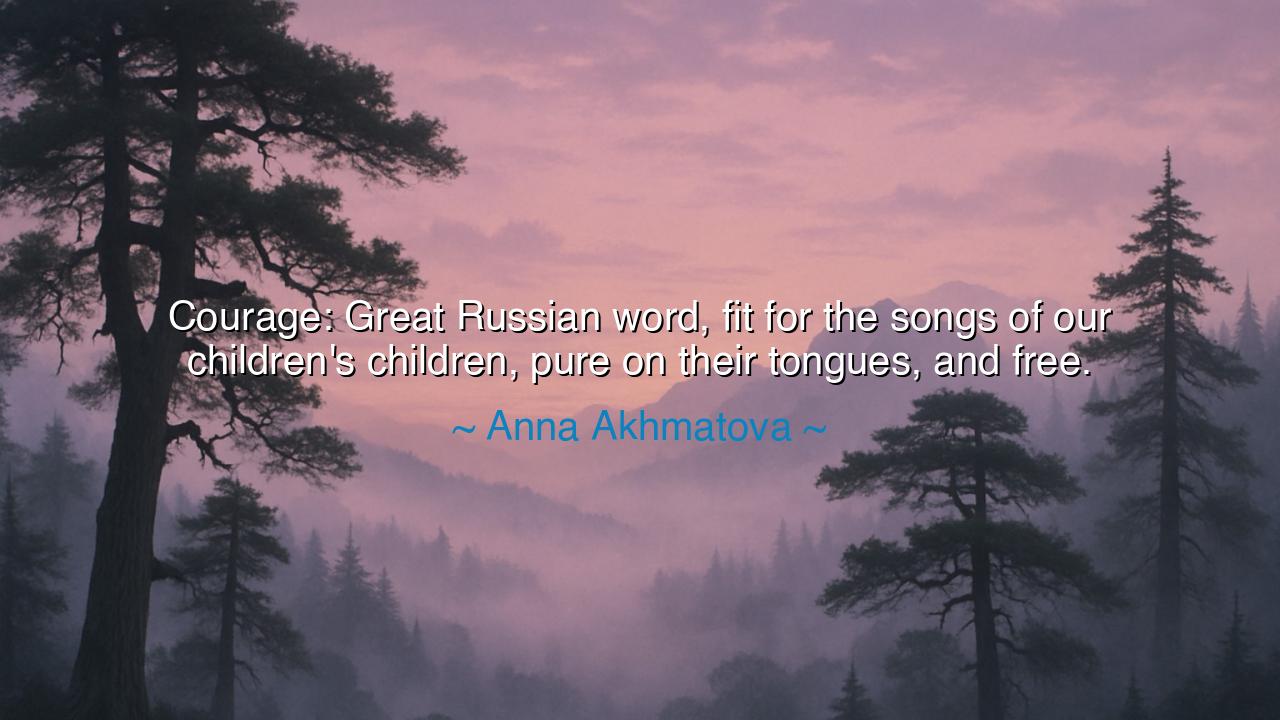
Courage: Great Russian word, fit for the songs of our children's
Courage: Great Russian word, fit for the songs of our children's children, pure on their tongues, and free.






When Anna Akhmatova wrote, “Courage: Great Russian word, fit for the songs of our children’s children, pure on their tongues, and free,” she did not speak as a poet in comfort, but as a prophet in a time of anguish. Her words were born amid the thunder of war and the shadow of oppression, when her beloved Russia stood wounded yet unbroken. In this single line, she captured the eternal essence of courage—not merely as valor on the battlefield, but as the inner flame that survives even when the world is consumed by darkness. For her, courage was not the absence of fear, but the refusal to surrender one’s soul to despair.
The origin of these words lies in 1942, during the Second World War, when Russia fought for its very existence against the invading armies of Nazi Germany. The city of Leningrad, where Akhmatova lived, was under siege; hunger, death, and silence ruled the streets. Yet in that bleakness, Akhmatova wrote her poem “Courage,” from which this quote is drawn. It was both a prayer and a promise—a call to endure, and to preserve the purity of the Russian spirit through the storm. Her courage, like the courage she praised, was not loud, but steadfast—a candle that refused to go out even when the wind howled against it.
In calling courage a “great Russian word,” Akhmatova was not speaking of nationalism, but of heritage—the inheritance of strength passed from one generation to the next. For her, courage was the soul’s language, a word that would live “pure on the tongues” of future children. She believed that true courage purifies those who hold it, because it binds them to what is noble, eternal, and free. In times when tyranny seeks to enslave both body and mind, courage becomes not only resistance but sanctity. It is the power to say “No” when the world demands silence, to remain human when cruelty would strip humanity away.
In the annals of history, there are few examples that mirror Akhmatova’s faith more clearly than the Siege of Leningrad itself. For nearly nine hundred days, the people of that city endured starvation, cold, and constant bombardment. Yet they did not yield. Children continued to study by candlelight; musicians performed symphonies amid the ruins; mothers whispered songs of hope over the graves of their loved ones. That, too, was courage—the quiet, defiant act of living. The same spirit that Akhmatova immortalized in her words became the legacy of her people, “fit for the songs of our children’s children.”
Akhmatova’s courage was not forged only by war, but by years of persecution under her own government. Her poetry was censored; her loved ones were imprisoned; her name was struck from public life. Yet she refused exile. She stayed with her people, saying, “I was with my people then, where my people, unfortunately, were.” Her courage was that of endurance—the strength to suffer without hatred, to bear witness without losing faith. And in that endurance, she discovered a form of freedom that no tyrant could take: the freedom of the soul that remains pure in truth and compassion.
Her words carry a universal truth that transcends time and nation. Courage, she tells us, is not merely a shield for war but a seed for peace. It is the force that keeps the human spirit free from corruption and fear. In every age, courage is needed—not only to face enemies without, but to conquer weakness within. It is needed by those who speak for justice, by those who love without guarantee of return, by those who build when all around them crumbles. It is the breath of those who continue when all seems lost, the word that keeps humanity from forgetting itself.
So, my children of spirit and endurance, remember Akhmatova’s teaching: guard the word courage as a sacred inheritance. Speak it not lightly, but live it deeply. Let it guide you when truth costs you comfort, when faith demands perseverance, when love requires sacrifice. For as she foretold, courage must remain pure and free, passed from tongue to tongue, heart to heart, until the end of days. And when your own trials come—as they surely will—remember this: the world may fall into silence, but the soul that holds to courage will never be voiceless.
For in the end, as Anna Akhmatova knew, it is not power, nor pride, nor victory that preserves a people—it is courage. And when courage lives in the hearts of the living, the songs of their children’s children will never cease.






AAdministratorAdministrator
Welcome, honored guests. Please leave a comment, we will respond soon